Do you know you can unknowingly form toxic relationships that are based on trauma? If that made you think about a certain person in your life, learn how you can identify the trauma bond signs and cut the cord before it’s too late.
Do you think you can’t leave your abusive partner? Do you feel hopeless when you go back to a relationship filled with pain? Or, do you dwell on your toxic ex and struggle to stay away?
This might suggest that you’ve caught yourself in a trauma bond, but don’t fret, this toxic relationship can be put to an end with the right attitude and course of action. Just learn to identify the trauma bond signs first.
Read: Are You Obsessed With Abuser?
What Is A Trauma Bond?

A trauma bond is a relationship that has been built due to intense, emotional experiences, often with a toxic and abusive person. A trauma bond holds us emotionally captive to a manipulator who keeps us “hostage”; which could be through physical or emotional abuse, much like the Stockholm Syndrome.
Trauma bonds are extensive mainly among toxic, abusive, and unhealthy relationships. The dominant partner develops a pattern of giving out punishments and rewards which makes the hostage physically and emotionally dependent on their abusive partner. They do this by showing periodic affection, small yet hollow acts of kindness, and making false promises just so their partner remains entangled in their trap of emotional abuse.
Now let’s take a look at the signs of a trauma bond.
Read: 6 Painful Ways Emotional Abuse Changes You
The 5 Trauma Bond Signs
Are you having a difficult time trying to understand why it is so hard to let go of a violent or abusive relationship? The five trauma bond signs can help you understand why.
1. You’re aware you’re in a violent or abusive relationship, but you don’t know if you’d survive without your dominant partner.
Trauma bonds can transform into an intense attachment with an individual who is causing you pain. It isn’t a surprise that at this point you feel like your mental and physical well-being depends on your partner. You put their needs above your own every time and let them dictate when you should feel safe, and when you are scared.
They establish disruptive unwritten rules by which you’re punished if they think you’ve broken them. One of the trauma bond signs is that you often get caught out because you are not made aware of these rules, or they change these rules without your notice. This is not accidental; they’re doing it on purpose to destabilize you and to demonstrate their power as the ultimate Rule Maker.

2. You live for the good times.
The dominant partner becomes a source of relief and comfort; because once they decide to reward you, they will not hit or shout at you. They may even apologize for their behavior and be extremely affectionate for a while, which they do intentionally.
Unfortunately, the relief that they provide is short-lived and you are once again at the hands of the inevitable abuse of your dominant partner. There is a blatantly uneven balance of power in this relationship, much like a twisted parent/child relationship in which you are treated like a puppet; having your strings pulled by your dominant partner.
Small wonder then, that as one of the most disturbing trauma bond signs, it is hard to imagine a world in which they aren’t there to govern your behavior and emotions.
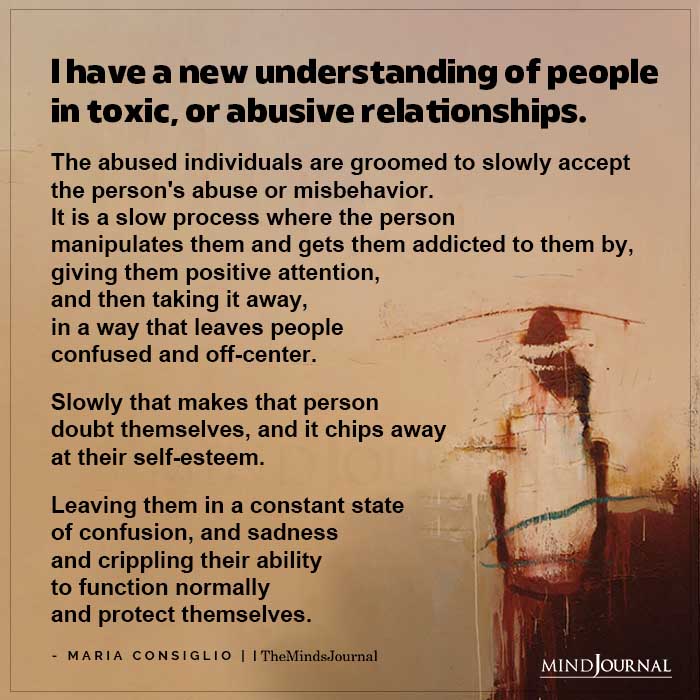
3. You lose all sense of your worth and value; you are willing to lower your standards to meet the needs of your toxic and abusive relationship
Your dominant partner has convinced you to believe that you are not worthy of affection, attention, and love even in areas that you were confident in. They make you feel like you are not enough and like you have to fight for their approval to make sure you meet the needs of your relationship.
You’ve been made to feel invisible, pushed to compete with others for your partner’s approval, and have been used for their benefit. One of the tell-tale trauma bond signs is that you end up lowering your standards and expectations for what a healthy relationship should actually be. This puts you in a position of spiraling down to self-destruction and loss of self-worth.
4. You are driven to the brink of self-destruction.
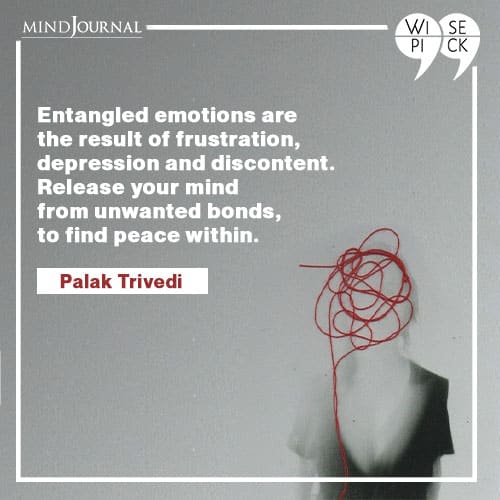
Toxic people drive you to destroy yourself; it’s like psychological murder with clean hands. A person’s ability to see themselves is clouded with an illusion controlled by their dominant partner in a trauma bond.
The next on our list of trauma bond signs that you need to look out for is that your self-worth is bombarded with lies and your sense of agency plunges when you’re in a toxic trauma bond. You come to think that you are not worthy of safety or peace which leads you to an automatic mental mechanism for self-sabotage.
You feel imprisoned and develop a sense of learned helplessness. Even if you have other options and choices, you don’t feel able and you’re not willing to take them if it means cutting the connection to the person you’re tied up to.
5. When you do leave them, you fall apart.

Withdrawal symptoms are also trauma bond signs. Memories and thoughts of your overbearing partner take over your every waking moment when you leave them. You have a hard time sleeping, and when you do drift off in an exhausted fog, you dream of them.
Although you know it isn’t worth it, you ache to go back to him/her and you know you dare not. The continuous cycle of complaining about yourself, believing you’re a pitiful masochist for missing someone who treats you so dreadfully goes on, days and nights on end.
You shed weight. Despite all the dreadful thoughts of them and flashbacks of the way you were mistreated, you still scroll through social media with hopes of wanting them to accept you once again.

Some describe the trauma bond as equivalent to addiction, in which you are emotionally and possibly even physiologically attached to your abusive partner. This experience can end up being mentally and physically traumatic, requiring exhausting and persistent effort to get away from them, and to stay away.
Read: 5 Reasons Why Letting Go of Love That Hurts You is Good For You.
How To Break A Trauma Bond?
- Understand that your resolve to live abuse-free could save your life, and it will in time enable you to be happier, healthier, and safer.
- If you are in a trauma bond the first step to breaking it is to recognize it. Recognize and realize what and how the bond has affected you and your lifestyle.
- The next step is to reconnect with reality. You can’t let your toxic partner’s actions and words cloud your judgment and drag you down anymore. Know that you are responsible for your own happiness and well-being.
- The last step is to reach out for support. Let a close family member or friend in on your situation. Let them help you to get back up when you feel like falling back into your toxic relationship. It’s always good to have someone around that understands your situation and wants to help you overcome it.
Read: How To Increase Dopamine?
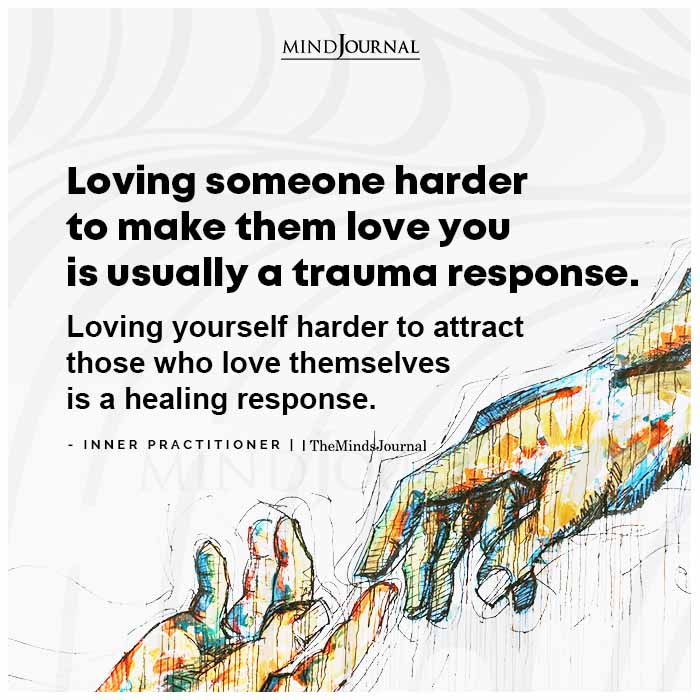
Strive For Your Freedom
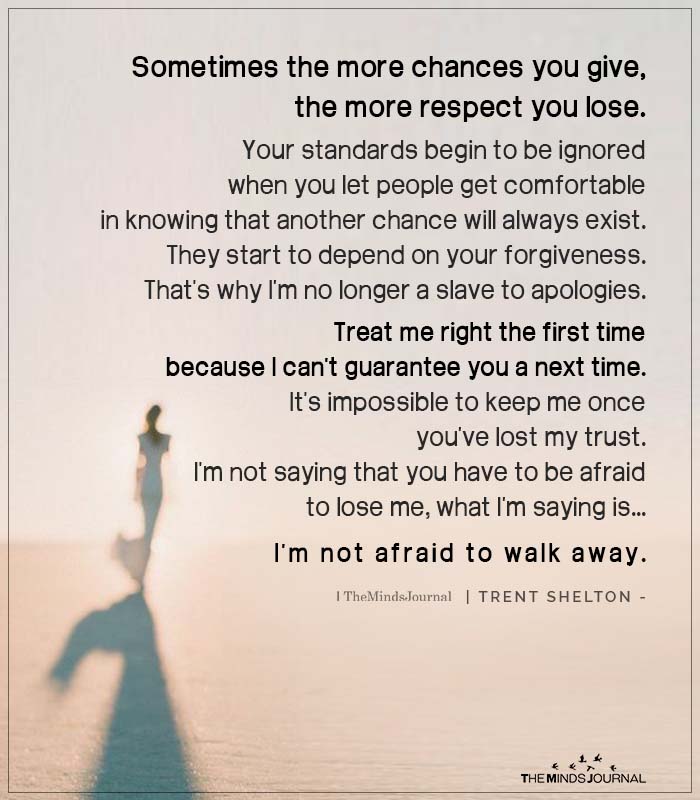
It takes effort and consistency to be completely free from a trauma bond, but in the end, the freedom and sense of self are worth it. So, detect the trauma bond signs early on in your relationships and protect yourself.
That was all for the topic of Trauma Bond Signs, let us know your thoughts by commenting down below.
Frequently Asked Questions
What are trauma bond withdrawal symptoms?
Breaking off a trauma bond can come with several withdrawal symptoms such as anxiety, recurrent flashbacks, hypervigilance, a feeling of helplessness, and confusion.
Can you be trauma bonded to someone if they aren’t in your life anymore?
Yes, you can form trauma bonds with an abusive partner or parent and remain emotionally invested in the relationship even when they’re not around anymore, especially if you don’t seek therapy or other intervention.
What is trauma bonding with a narcissist?
Narcissists use intermittent rewards and punishment to perpetuate a cycle of abusive treatment toward their victims. Due to this psychological tactic, the victim gets reeled in and prolongs the trauma bond unknowingly.

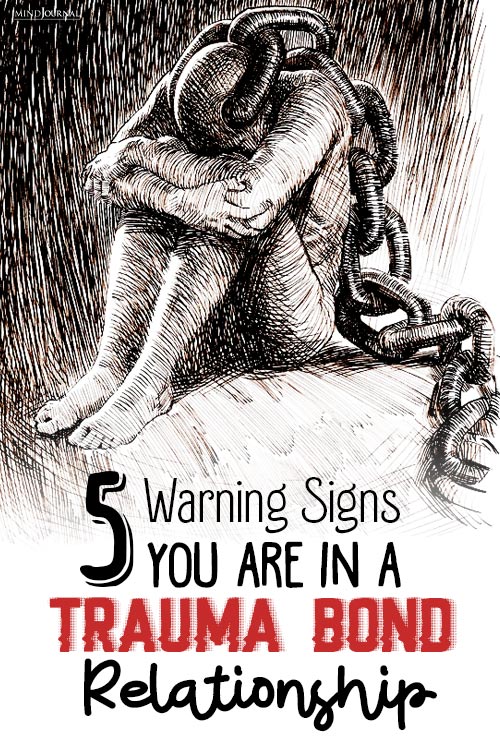


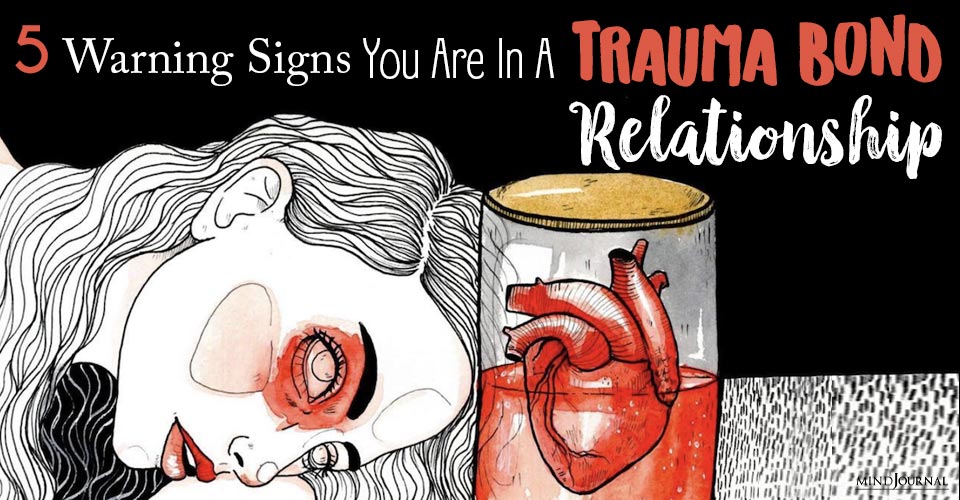







Leave a Reply